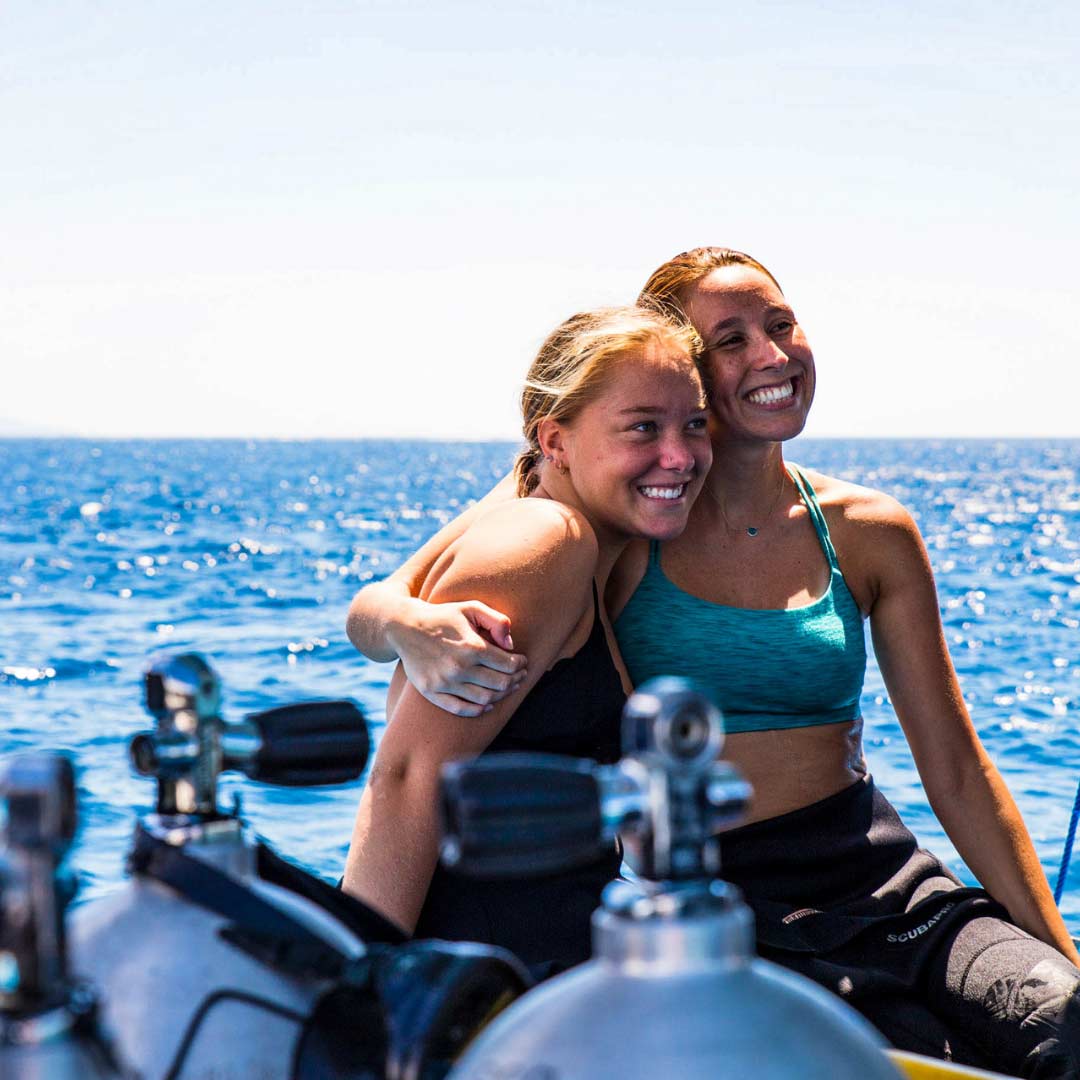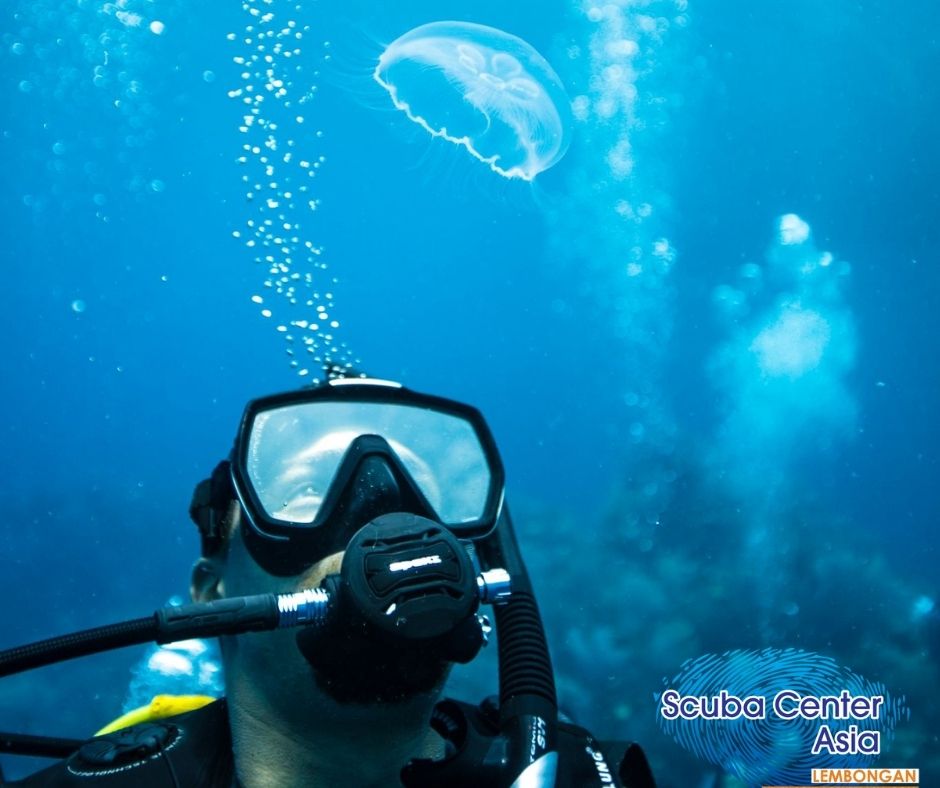
I was born in the bath. My mum said this was a sign that I was destined to be a “water baby”. As a child, you would struggle to pull me away from the water. Whether it was a pool, the ocean or a muddy puddle, you could find me in it! I would spend hours dreaming about the ocean. I truly believed I was a mermaid trapped in a human body!
As I grew up, I became frustrated with how little time I could spend exploring the underwater world.
The summer after I turned eight, a new world was opened up to me when I was enrolled in the PADI Seal Team program. It was at this point that my dreams of becoming a mermaid came true. With every breath taken underwater increasing the joy I felt. Nothing in my life had been better than sitting at the bottom of a swimming pool with a regulator in my mouth.
My love of diving grew as I got older. Taking my Open Water course, Advanced Open Water course and then my Rescue course. Each stage and each improvement in my diving gave me a sense of joy that I could never find in any other area of my life. Now I am enjoying working towards my Divemaster qualification. And look forward to a long career showing others the world that brought so much happiness to my life.
As I grow older I know that my diving career will grow with me both physically, emotionally and mentally. Which in turn will allow me to lead a happy and healthy life well into old age.

Diving is becoming increasingly accessible to people of all ages
Diving is both an adventurous sport and a leisure activity which is becoming more and more popular. The reason for this sport’s popularity is clear. Diving is more accessible than ever. Travel is becoming cheaper. Gear is better than ever, and more and more people are developing a taste for the adventurous!
People of all ages are being opened up to the wonders of the underwater world. This is an exciting opportunity for many people. Especially as diving has a huge number of benefits to both physical and mental health. But, like all sports, it comes with an inherent risk.
With almost 11% of divers qualified each year under the age of 18, and 1.5% of divers being under the age of 12, it is important that these risks are taken into consideration. The same is true for older populations. Diving has seen a sharp increase in the number of women over the age of 40 taking up the sport. Meaning there is a need for more information about the risks to older divers.
Younger divers
There has been very little research into the effects of scuba diving on children. This is for many reasons, primarily for the protection of our youngest populations. The research that has been done has only ever focused on children older than eight (the minimum age to enrol in a PADI scuba diving course). Most information is about divers aged between 12 and 18.
Children and teenagers are far more likely to be at risk of dive related injuries than adults. Common injuries include ear rupture and infections. These injuries are more common in children due to children having smaller Eustachian tubes than adults. This makes equalizing more difficult.
Younger people can also find it more difficult to off-gas than adults for many reasons. These include becoming cold more quickly, having a higher body fat percentage and having a higher rate of respiration. A 25-minute dive to 10m was found to saturate the tissues of 12 to15 year olds. Despite having no symptoms of decompression sickness, grade 1 (small) nitrogen bubbles formed in the heart of the participants.
This suggests that children younger than 15 should not make repetitive dives. Nor should they dive deeper than the current PADI recommendation of 12 meters for Junior Open Water divers, or 21 meters for Junior Advanced Open Water Divers.
Despite these risks, children older than eight should not be discouraged to dive. Young people should enjoy diving as much as is safely possible. Diving has been shown to improve confidence, mood and overall well being. Furthermore, diving is a team sport with a close-knit community who look out for each other. These communities allow children and young people to learn about teamwork, make friends and have fun.

Older divers
There is a larger body of research surrounding the effects of diving on the older population. Like young people, older divers need to take certain factors into consideration when diving. People over the age of 40 are more likely to have a heart attack or stroke. Heavy exercise and anxiety (which can occur during diving) can be a trigger for these conditions. This means that divers predisposed to these conditions must be careful when diving.
However, regular divers benefit from increased physical fitness. And thus have a reduced likelihood of suffering from a heart attack or stroke. You do not have to have been diving your whole life to be able to enjoy the benefits of diving in your later years. As diving is a low impact sport, it may be an excellent option for those who want a sport a little more exciting than swimming in a pool.
Older divers need to make some practical decisions when it comes to diving. Especially when choosing a dive site. This is because older divers are more susceptible to the cold. As well as having reduced physical capabilities, such as reduced muscle mass and increased joint problems. These things may make cold shore dives impossible for some older divers. Choosing a warm water dive site and diving off a boat can make diving more comfortable and enjoyable.
Older divers are able to enjoy diving in a way younger divers may not be able to. First, age brings a great deal of wisdom that may make learning to dive easier than when you’re younger. This allows older divers to make more prudent and informed decisions about the dives that they make. Thus, making them safer divers.
Older divers also often enjoy the benefit of time and the ability to afford to visit some of the most incredible dive sites in the world.

Diving also offers the benefit of improving your mental health
Diving is an excellent sport for people of all ages due to its ability to increase physical fitness and improve mental health and agility. Physical activity has been shown to aid in mental well-being. It does this by increasing blood flow to the brain and releasing feel-good hormones.
Diving also encourages teamwork and supports a sense of community. These factors have been shown to be vital to good mental health. This is especially true as we age. Retirement can be a particularly isolating time. This can lead to a steep decline in physical and mental health.
Participating in activities, such as diving, that allow individuals to be part of a community of like-minded people has significant long term health benefits.
General considerations for diving well at any point in life
Diving is a fun and fulfilling sport. Almost anyone of any age can enjoy diving. To be able to enjoy this wonderful sport it is important to keep in good health throughout your life. Having a good base level of fitness, a healthy diet and not being over or underweight are important. These will not only allow you to continue diving but also expect to have a longer and healthier life in general.
You can also expect to enjoy diving for longer by not drinking large amounts of alcohol and smoking.
Overall, diving is a fun sport with some inherent risks for people of all ages. But with a healthy lifestyle, and good dive planning, you should be able to enjoy diving for many many years.



